(!)NOTE : Windows 7 users won’t be able to use some latest features of eCatalog/WOS since Microsoft is ending support for Windows 7 on 14 Jan, 2020. Please upgrade your system for uninterrupted services.
- Notice of End of Sales for Economy Series Pneumatic Equipment Category. More information.
Ball Bearings(Specifications, Environment:For High Speed)
Brand |
|
|---|---|
Filter By |
|
| CAD |
|
| Days to Ship |
|
5 items
- Sort By
-
Recommended
You can add up to 6 items per a category to the compare list.

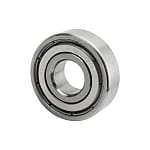

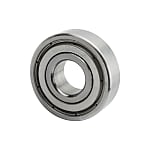
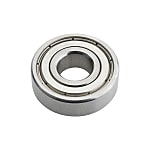
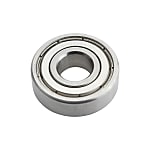 MiSUMi Economy
MiSUMi Economy MiSUMi Economy
MiSUMi EconomyMISUMI
New at MISUMI? Get 20% Discount on your First Purchase. Click to Register Now
MISUMI India supplies premium range of stainless steel ball bearings designed to meet the highest standards of quality and durability. Engineered for precision and reliability, these ball bearings are ideal for various industrial applications, ensuring smooth and efficient performance. MISUMI India stands out with its unbeatable pricing, delivering high-quality products at the lowest cost. Additionally, their same-day shipping service ensures quick delivery, meeting urgent requirements and minimizing downtime for businesses. Whether for manufacturing, machinery, or engineering needs, MISUMI India's stainless steel ball bearings are a dependable choice.
Feature:
● Bearing Size Standards: Metric System
● Inner Diameter Minimum / Maximum (mm.) : 10 and 50
● Outer Diameter Minimum / Maximum (mm.): 15 and 110
● Width Minimum / Maximum (mm.): 4 and 27
● Precision (JIS): Class 0
● Bearing Type: Closed (Double Shielded (ZZ))
● Load Direction: Radial
[Application]
It is used to support and guide rotating machine's components, such as shafts, wheels, pulleys ,etc- Volume Discount
Inner Dia. d(Ø) Outer Dia. D(Ø) Width B(mm) Raceway Ring Shape Bearing Type Outer Ring Type Inner/Outer Ring Material Basic Dynamic Load Rating(N) Specifications, Environment Precision (JIS) Load Direction Rolling Element Material Size Standards Number of Raceway Ring Rows 17 47 14 Ball Double Shielded Flat Stainless Steel 6843 For High Speed Class 0 Radial Stainless Steel Metric System Single Row From: ₹ 326.00 Special Price Days to Ship: Same day  Same day
Same day
-
You can add up to 6 items per a category to the compare list.
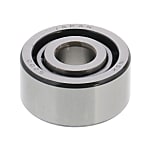

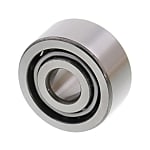
Angular Ball Bearing (Single Row/Double Row)
NSK
New at MISUMI? Get 20% Discount on your First Purchase. Click to Register Now
Angular Ball Bearing (Single Row/Double Row) by MISUMI India
MISUMI India is a trusted supplier of high-quality Angular Ball Bearings (Single Row/Double Row) designed to meet diverse industrial needs. Our bearings are offered at the lowest price and come with the convenience of same-day shipping for quick delivery.
Product Description:
Angular Ball Bearings are versatile components capable of supporting both radial loads and large axial loads in one direction, ensuring reliable performance in demanding applications.
Key Features:
Contact Angle Options: Available in 15°, 25°, 30°, and 40° to suit varying load and speed requirements.
Retainer Materials: Choose from polyamide, steel, or brass retainers for optimal compatibility and durability.
Precision Engineering: Ensures smooth operation, enhanced rigidity, and improved shaft rotation accuracy.
Applications:
Ideal for hydraulic and vertical pumps, Angular Ball Bearings are designed to handle combined radial and axial loads effectively. They are perfect for machine tool spindles, ensuring precise and rigid shaft rotation for enhanced performance. These bearings are also widely used in grinding spindles and electromagnetic clutches of automotive air conditioning systems, making them versatile components for various industrial applications.- Volume Discount
Inner Dia. d(Ø) Outer Dia. D(Ø) Width B(mm) Raceway Ring Shape Bearing Type Outer Ring Type Inner/Outer Ring Material Basic Dynamic Load Rating(N) Specifications, Environment Precision (JIS) Load Direction Rolling Element Material Size Standards Number of Raceway Ring Rows 6 ~ 240 17 ~ 360 6 ~ 65 Angular Bearing (Single) / Angular Bearing (Double) Open / Double Shielded Flat Steel / Stainless Steel 600 ~ 300000 For High Speed Class 0 / Class 4 / Class 5 Radial Steel / Stainless Steel / Ceramics Metric System - From: ₹ 976.76 Days to Ship: Same day or more  Same day or more
Same day or more
-
You can add up to 6 items per a category to the compare list.
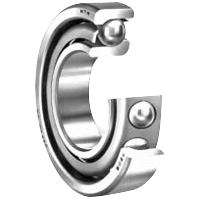
Ball Bearing, Precision Angular Contact
NTN
Accuracy grade 4 and 5 precision angular contact ball bearings.
Inner Dia. d(Ø) Outer Dia. D(Ø) Width B(mm) Raceway Ring Shape Bearing Type Outer Ring Type Inner/Outer Ring Material Basic Dynamic Load Rating(N) Specifications, Environment Precision (JIS) Load Direction Rolling Element Material Size Standards Number of Raceway Ring Rows 15 ~ 25 32 ~ 47 9 ~ 12 Angular Bearing (Single) Open Flat Steel 4750 ~ 8950 For High Speed Class 2 / Class 4 Radial Steel Metric System Single Row From: ₹ 6,030.58 Days to Ship: 8 Day(s) or more  8 Day(s) or more
8 Day(s) or more
-
You can add up to 6 items per a category to the compare list.
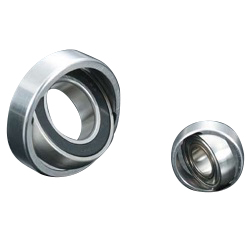
SH Series Stainless Steel Bearing SSA Type With Aligning Features
NANKAISEIKOJO
Stainless steel bearing made of SUS440C which is designed to tolerate deflection of a large roller and features an extended maintenance period due to implementation of an aligning function.
[Features]
· The inclusion of an alignment function to a conventional stainless bearing makes it possible to support deflection of large rollers such as chemical film rollers, and by adding the corrosion resistance of stainless steel the maintenance period has been greatly increased.
· Because SUS440C stainless steel is used, the bearing is ideal for corrosive environments, clean rooms and food processing equipment.
· By adjusting the axial center error caused by deflection of the shaft of transport rollers, etc. as well as mounting failure, abnormal loads on the bearing are reduced.
· Both the seal and shield serve as a sealing device, to prevent infiltration of dirt, dust, solutions, etc.Inner Dia. d(Ø) Outer Dia. D(Ø) Width B(mm) Raceway Ring Shape Bearing Type Outer Ring Type Inner/Outer Ring Material Basic Dynamic Load Rating(N) Specifications, Environment Precision (JIS) Load Direction Rolling Element Material Size Standards Number of Raceway Ring Rows 10 ~ 30 30 ~ 72 9 ~ 19 Self-Aligning Ball Open Flat Stainless Steel 4600 ~ 19500 For High Speed Class 0 Radial / Thrust Stainless Steel Metric System Single Row From: ₹ 5,453.02 Days to Ship: 5 Day(s) or more  5 Day(s) or more
5 Day(s) or more
-
You can add up to 6 items per a category to the compare list.
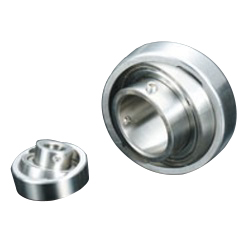
SH Series Stainless Steel Bearing SSXCA Type With Aligning Features
NANKAISEIKOJO
Stainless steel bearing made of SUS440C which is designed to tolerate deflection of a large roller and features an extended maintenance period due to implementation of an aligning function. Line up includes additional models with included set screws.
[Features]
· Because SUS440C stainless steel is used, the bearing is ideal for corrosive environments, clean rooms and food processing equipment.
· By adjusting the axial center error caused by deflection of the shaft of transport rollers, etc. as well as mounting failure, abnormal loads on the bearing are reduced.
· Both the seal and shield serve as a sealing device, to prevent infiltration of dirt, dust, solutions, etc.
· Because the main dimensions are the same as JIS standard sizes 6,200, 6,300, 1,200, and 1,300 (excluding some parts: refer to the back side), replacement is easy.
· Superior performance over self-aligning ball bearings made using conventional SUJ2Inner Dia. d(Ø) Outer Dia. D(Ø) Width B(mm) Raceway Ring Shape Bearing Type Outer Ring Type Inner/Outer Ring Material Basic Dynamic Load Rating(N) Specifications, Environment Precision (JIS) Load Direction Rolling Element Material Size Standards Number of Raceway Ring Rows 10 30 15.5 Self-Aligning Ball Double Shielded Flat Stainless Steel 4600 For High Speed Class 0 Radial / Thrust Stainless Steel Metric System Single Row From: ₹ 10,108.76 Days to Ship: 25 Day(s) or more  25 Day(s) or more
25 Day(s) or more
| Brand |
|---|
| Product Series |
| CAD |
| From |
| Days to Ship |
| Specifications |
| Inner Dia. d(Ø) |
| Outer Dia. D(Ø) |
| Width B(mm) |
| Raceway Ring Shape |
| Bearing Type |
| Outer Ring Type |
| Inner/Outer Ring Material |
| Basic Dynamic Load Rating(N) |
| Specifications, Environment |
| Precision (JIS) |
| Load Direction |
| Rolling Element Material |
| Size Standards |
| Number of Raceway Ring Rows |
You can add up to 6 items per a category to the compare list. | You can add up to 6 items per a category to the compare list. | You can add up to 6 items per a category to the compare list. | You can add up to 6 items per a category to the compare list. | You can add up to 6 items per a category to the compare list. | |
| Brand | MISUMI | NSK | NTN | NANKAISEIKOJO | NANKAISEIKOJO |
| Product Series | SH Series Stainless Steel Bearing SSA Type With Aligning Features | SH Series Stainless Steel Bearing SSXCA Type With Aligning Features | |||
| CAD |
|
|
| ||
| From | ₹ 326.00 Special Price On Sale Till 31/03/2025 | ₹ 976.76 | ₹ 6,030.58 | ₹ 5,453.02 | ₹ 10,108.76 |
| Days to Ship | Same day | Same day or more | 8 Day(s) or more | 5 Day(s) or more | 25 Day(s) or more |
| Specifications | |||||
| Inner Dia. d(Ø) | 17 | 6 ~ 240 | 15 ~ 25 | 10 ~ 30 | 10 |
| Outer Dia. D(Ø) | 47 | 17 ~ 360 | 32 ~ 47 | 30 ~ 72 | 30 |
| Width B(mm) | 14 | 6 ~ 65 | 9 ~ 12 | 9 ~ 19 | 15.5 |
| Raceway Ring Shape | Ball | Angular Bearing (Single) / Angular Bearing (Double) | Angular Bearing (Single) | Self-Aligning Ball | Self-Aligning Ball |
| Bearing Type | Double Shielded | Open / Double Shielded | Open | Open | Double Shielded |
| Outer Ring Type | Flat | Flat | Flat | Flat | Flat |
| Inner/Outer Ring Material | Stainless Steel | Steel / Stainless Steel | Steel | Stainless Steel | Stainless Steel |
| Basic Dynamic Load Rating(N) | 6843 | 600 ~ 300000 | 4750 ~ 8950 | 4600 ~ 19500 | 4600 |
| Specifications, Environment | For High Speed | For High Speed | For High Speed | For High Speed | For High Speed |
| Precision (JIS) | Class 0 | Class 0 / Class 4 / Class 5 | Class 2 / Class 4 | Class 0 | Class 0 |
| Load Direction | Radial | Radial | Radial | Radial / Thrust | Radial / Thrust |
| Rolling Element Material | Stainless Steel | Steel / Stainless Steel / Ceramics | Steel | Stainless Steel | Stainless Steel |
| Size Standards | Metric System | Metric System | Metric System | Metric System | Metric System |
| Number of Raceway Ring Rows | Single Row | - | Single Row | Single Row | Single Row |
Loading...
Configure
Specification/Dimensions
-
Inner Dia. d(Ø)
- 1
- 1.5
- 2
- 2.5
- 3
- 3.175/0.1250
- 4
- M4
- 4.762/0.1875
- 5
- 6
- M6
- 6.350/0.2500
- 7
- 8
- M8
- 9
- 9.525/0.3750
- 10
- 12
- 12.700/0.5000
- 13
- 14
- 15
- 15.875/0.6250
- 16
- 17
- 18
- 19
- 20
- 22
- 25
- 27
- 28
- 30
- 32
- 35
- 37
- 40
- 42
- 45
- 47
- 50
- 52
- 55
- 57
- 57.150
- 60
- 62
- 65
- 67
- 68
- 70
- 72
- 75
- 77
- 80
- 82
- 85
- 90
- 93
- 95
- 100
- 103
- 105
- 110
- 113
- 120
- 123
- 130
- 133
- 140
- 143
- 144
- 150
- 160
- 163
- 170
- 180
- 190
- 200
- 204
- 220
- 240
- 260
- 280
- 300
- 304
- 320
- 340
- 360
- 380
- 400
- 420
- 440
- 460
-
Outer Dia. D(Ø)
- 3
- 4
- 5
- 6
- 7
- 8
- 8.1
- 8.2
- 9
- 9.5
- 9.525/0.3750
- 10
- 10.2
- 11
- 11.5
- 11.6
- 12
- 12.2
- 12.5
- 12.700/0.5000
- 13
- 13.5
- 14
- 14.6
- 15
- 15.6
- 15.875/0.6250
- 16
- 17
- 18
- 19
- 20
- 21
- 22
- 22.225/0.8750
- 23
- 24
- 25
- 26
- 27
- 28
- 28.575/1.1250
- 30
- 31
- 32
- 34.925/1.3750
- 35
- 37
- 38
- 40
- 42
- 44
- 47
- 50
- 52
- 55
- 56
- 58
- 60
- 62
- 65
- 68
- 70
- 72
- 73
- 74
- 75
- 78
- 80
- 82
- 85
- 90
- 95
- 100
- 105
- 110
- 115
- 120
- 125
- 130
- 135
- 140
- 145
- 149.225
- 150
- 155
- 160
- 165
- 170
- 175
- 180
- 190
- 195
- 200
- 210
- 215
- 220
- 225
- 230
- 235
- 240
- 250
- 260
- 270
- 280
- 290
- 300
- 310
- 320
- 340
- 350
- 360
- 380
- 400
- 420
- 430
- 440
- 460
- 480
- 500
- 520
- 540
- 560
- 580
- 600
- 620
-
Width B(mm)
- 1
- 1.2
- 1.5
- 1.6
- 1.8
- 2
- 2.3
- 2.5
- 2.6
- 2.8
- 3
- 3.5
- 3.967/0.1562
- 4
- 4.5
- 4.978/0.1960
- 5
- 5.5
- 6
- 6.5
- 7
- 7.142/0.2812
- 7.72
- 7.938/0.25
- 7.938/0.3125
- 8
- 8.6
- 8.733/0.3438
- 9
- 9.6
- 10
- 10.4
- 10.5
- 11
- 12
- 12.36
- 13
- 13.64
- 14
- 14.3
- 15
- 15.5
- 15.9
- 16
- 17
- 17.5
- 18
- 19
- 20
- 20.6
- 21
- 22
- 22.2
- 23
- 23.8
- 24
- 25
- 25.4
- 26
- 27
- 28
- 29
- 30
- 30.2
- 31
- 32
- 33
- 33.3
- 34
- 34.9
- 35
- 36
- 36.5
- 37
- 38
- 38.1
- 39
- 39.7
- 40
- 41
- 41.3
- 42
- 43
- 44
- 44.4
- 45
- 46
- 47
- 48
- 49
- 49.2
- 50
- 51
- 52
- 53
- 54
- 54.229
- 55
- 56
- 57
- 58
- 58.7
- 59
- 60
- 61
- 62
- 63
- 63.5
- 64
- 65
- 66
- 67
- 68
- 70
- 72
- 73
- 74
- 75
- 76
- 77
- 78
- 79
- 80
- 81
- 82
- 86
- 87
- 88
- 89
- 90
- 92
- 94
- 95
- 105
- 110
- 112
- 117
- 128
- 130
-
Raceway Ring Shape
-
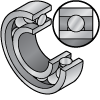 Ball
Ball -
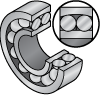 Self-Aligning Ball
Self-Aligning Ball -
 Angular Bearing (Single)
Angular Bearing (Single) -
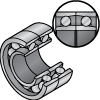 Angular Bearing (Double)
Angular Bearing (Double) -
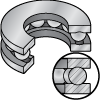 Thrust Bearing
Thrust Bearing
-
-
Bearing Type
-
 Open
Open -
 Double Shielded
Double Shielded -
 Rubber Sealed
Rubber Sealed -
 Single Shielded
Single Shielded
-
-
Outer Ring Type
- Flat
- Spherical
- With V-Shaped Groove
- With U-Shaped Groove
- With Retaining Ring Grooves
- With Flange
- Deep Groove
-
Inner/Outer Ring Material
- Steel
- Stainless Steel
- Plastic
-
Basic Dynamic Load Rating(N)
- 0.6
- 0.64
- 0.66
- 0.7
- 0.73
- 1,610
- 1.28
- 1.34
- 1.46
- 1.89
- 2.02
- 2.56$350000
- 2.8
- 3,350
- 3.01
- 3.19
- 3.26
- 3.57
- 3.92
- 4,300
- 4.27
- 4.48
- 4.76
- 4.94
- 5,100
- 5.43
- 5.74
- 6.58
- 6.72
- 6.79
- 7,600
- 7,750
- 7.07
- 7.98
- 8,300
- 8.96
- 9,400
- 9,600
- 9,700
- 9.24
- 9.45
- 9.8
- 11.13
- 12,800
- 13.65
- 14,000
- 14.84
- 15,900
- 26,700
- 28,500
- 36,000
- 36,500
- 40,000
- 41,500
- 44,500
- 52
- 66
- 67
- 68
- 76,500
- 80
- 85
- 91
- 95
- 100
- 100.1
- 102
- 104
- 105
- 106
- 111
- 112
- 120
- 122
- 123.9
- 124
- 124.6
- 125
- 129
- 129.5
- 136
- 138
- 143
- 144
- 146
- 151.9
- 152
- 153
- 155
- 159
- 167
- 169
- 171
- 174
- 177
- 178
- 185
- 187
- 188
- 192
- 195
- 196
- 196.7
- 197
- 199
- 200
- 208
- 209
- 212
- 217
- 218
- 221
- 222
- 229
- 229.6
- 231
- 231.7
- 235
- 236
- 237
- 242
- 251
- 255
- 256
- 258
- 270
- 273
- 275
- 277
- 278
- 281
- 282
- 288
- 289
- 292
- 294
- 294.7
- 304
- 308
- 310
- 311
- 319
- 323.4
- 324
- 325
- 326
- 327
- 328
- 330
- 331
- 331.8
- 332
- 339
- 339.5
- 340
- 347
- 350
- 355
- 360
- 361
- 365
- 366
- 375
- 375.2$296000
- 380
- 380.8
- 381
- 381.5
- 385
- 386
- 387
- 390
- 392
- 395
- 396
- 399
- 400
- 407
- 408
- 421
- 424
- 424.9
- 430
- 431
- 434
- 438
- 441
- 442
- 448
- 455
- 459
- 462
- 463
- 465
- 468
- 470
- 473
- 474
- 476
- 478.8
- 480
- 484
- 485
- 490
- 495
- 496
- 497
- 500
- 500.5
- 501
- 505
- 510
- 515
- 520
- 535
- 536
- 540
- 541
- 542
- 543
- 544
- 545
- 547
- 550.9
- 552
- 555
- 557.2
- 558
- 560
- 569
- 570
- 571
- 598.5
- 599
- 600
- 604
- 607
- 608
- 630
- 631
- 635
- 640
- 640.5
- 641
- 642.6
- 643
- 648
- 648.2
- 650
- 657
- 658
- 660
- 663
- 669.9
- 670
- 677
- 680
- 684
- 686
- 694
- 697
- 700
- 710
- 711
- 714
- 715
- 716
- 730
- 740
- 755
- 756
- 756$17900
- 773
- 773.5
- 780
- 784
- 787
- 795
- 796
- 797
- 797.3
- 799
- 800
- 813
- 814
- 815
- 816
- 817
- 820
- 825
- 830
- 850
- 855
- 859
- 867
- 868
- 874
- 875
- 910
- 912
- 915
- 918
- 919
- 920
- 926
- 930
- 931
- 937
- 938
- 940
- 945
- 945$4930
- 950
- 957
- 957.6
- 958
- 960
- 969
- 970
- 995
- 1000
- 1021.3
- 1025
- 1028.3
- 1029
- 1040
- 1041
- 1046
- 1048
- 1077
- 1080
- 1082
- 1091
- 1100
- 1105
- 1120
- 1127
- 1130
- 1131
- 1139
- 1140
- 1142
- 1143
- 1170
- 1173
- 1182
- 1201
- 1210
- 1210.3
- 1211
- 1233.4
- 1250
- 1252
- 1280
- 1283
- 1300
- 1301
- 1310
- 1327
- 1329
- 1330
- 1330.7
- 1331
- 1340
- 1340.5
- 1341
- 1344
- 1344.7
- 1350
- 1360
- 1368
- 1369
- 1389.5
- 1390
- 1393
- 1400
- 1402
- 1451
- 1451.1
- 1459
- 1460
- 1462
- 1469
- 1470
- 1471
- 1480
- 1509.2
- 1533
- 1560
- 1563
- 1563.1
- 1579
- 1605
- 1610
- 1630
- 1635
- 1635.2
- 1638
- 1650
- 1665
- 1686
- 1716
- 1717.1
- 1720
- 1729
- 1730
- 1760
- 1762
- 1770
- 1777
- 1790
- 1830
- 1866
- 1883
- 1887
- 1890
- 1900
- 1901
- 1904
- 1915
- 1920
- 1921
- 1924
- 1959
- 1959.3
- 1983
- 1985
- 1986
- 1989
- 1990
- 2020
- 2020.2
- 2030
- 2032
- 2070
- 2073
- 2080
- 2090
- 2120
- 2150
- 2156
- 2176
- 2185
- 2190
- 2230
- 2233
- 2237
- 2240
- 2260
- 2263
- 2290
- 2304
- 2308
- 2321
- 2336
- 2340
- 2345
- 2350
- 2390
- 2450
- 2453
- 2467
- 2480
- 2490
- 2516
- 2530
- 2560
- 2570.4
- 2580
- 2593
- 2630
- 2645
- 2670
- 2687
- 2695
- 2700
- 2715
- 2730
- 2750
- 2760
- 2799
- 2800
- 2810.5
- 2811
- 2831
- 2833
- 2883
- 2886
- 2890
- 2900
- 3000
- 3010
- 3012
- 3012.1
- 3024.7
- 3025
- 3026
- 3190
- 3194
- 3200
- 3211.6
- 3212
- 3222
- 3260
- 3287
- 3290
- 3293
- 3300
- 3313
- 3327
- 3330
- 3332
- 3333
- 3350
- 3356
- 3399
- 3400
- 3410
- 3430
- 3443
- 3450
- 3484
- 3530
- 3560
- 3570
- 3650
- 3660
- 3660$8200
- 3670
- 3672
- 3700
- 3790
- 3857
- 3860
- 3868
- 3870
- 3879
- 3900
- 3910
- 3920
- 4000
- 4015
- 4020
- 4089
- 4150
- 4180
- 4185
- 4270
- 4300
- 4303
- 4321
- 4325
- 4330
- 4340
- 4350
- 4400
- 4450
- 4466.7
- 4467
- 4480
- 4500
- 4538
- 4540
- 4550
- 4560
- 4563
- 4575
- 4588
- 4590
- 4600
- 4620
- 4650
- 4658
- 4659
- 4700
- 4707
- 4729
- 4740
- 4750
- 4752
- 4760
- 4810
- 4837
- 4900
- 4900.7
- 4901
- 4905
- 4923
- 4930
- 4940
- 4950
- 5000
- 5050
- 5080
- 5090
- 5100
- 5108
- 5109
- 5200
- 5259
- 5300
- 5350
- 5400
- 5420
- 5430
- 5450
- 5500
- 5550
- 5590
- 5600
- 5610
- 5619
- 5690
- 5700
- 5740
- 5770
- 5780
- 5800
- 5900
- 5950
- 5992
- 5999
- 6000
- 6010
- 6100
- 6119
- 6150
- 6187
- 6210
- 6250
- 6350
- 6374
- 6381
- 6400
- 6477
- 6490
- 6500
- 6580
- 6600
- 6610
- 6690
- 6720
- 6750
- 6786
- 6790
- 6800
- 6843
- 6870
- 6900
- 6950
- 7000
- 7001
- 7002
- 7050
- 7070
- 7100
- 7150
- 7237
- 7242
- 7250
- 7280
- 7300
- 7350
- 7400
- 7420
- 7450
- 7500
- 7550
- 7600
- 7620
- 7650
- 7700
- 7750
- 7800
- 7850
- 7900
- 7950
- 7960
- 7980
- 7990
- 8000
- 8024
- 8050
- 8090
- 8100
- 8130
- 8150
- 8200
- 8240
- 8250
- 8330
- 8350
- 8500
- 8540
- 8550
- 8590
- 8600
- 8630
- 8650
- 8750
- 8800
- 8850
- 8950
- 8960
- 9000
- 9050
- 9240
- 9265
- 9270
- 9300
- 9310
- 9385
- 9400
- 9440
- 9450
- 9500
- 9550
- 9600
- 9650
- 9699
- 9700
- 9710
- 9750
- 9800
- 9870
- 9877
- 9900
- 9950
- 10000
- 10062
- 10100
- 10150
- 10200
- 10300
- 10400
- 10404
- 10500
- 10570
- 10600
- 10699
- 10700
- 10800
- 10880
- 10900
- 10910
- 11000
- 11100
- 11130
- 11200
- 11220
- 11240
- 11300
- 11400
- 11434
- 11500
- 11550
- 11600
- 11626
- 11630
- 11690
- 11700
- 11760
- 11800
- 11900
- 11980
- 11985
- 12000
- 12100
- 12110
- 12200
- 12240
- 12300
- 12350
- 12359
- 12400
- 12500
- 12600
- 12700
- 12800
- 12900
- 13000
- 13100
- 13200
- 13229
- 13300
- 13400
- 13490
- 13500
- 13560
- 13600
- 13621
- 13650
- 13678
- 13700
- 13790
- 13900
- 14000
- 14014
- 14100
- 14200
- 14250
- 14280
- 14300
- 14400
- 14420
- 14500
- 14540
- 14600
- 14630
- 14700
- 14800
- 14840
- 14900
- 15000
- 15100
- 15150
- 15200
- 15260
- 15300
- 15400
- 15600
- 15750
- 15800
- 15900
- 15936
- 15965
- 16000
- 16100
- 16200
- 16400
- 16500
- 16530
- 16600
- 16700
- 16769
- 16800
- 16900
- 17000
- 17200
- 17300
- 17400
- 17490
- 17500
- 17600
- 17765
- 17800
- 17990
- 18000
- 18100
- 18200
- 18300
- 18400
- 18500
- 18510
- 18530
- 18600
- 18690
- 18700
- 18800
- 18900
- 19000
- 19100
- 19200
- 19300
- 19400
- 19456
- 19500
- 19600
- 19700
- 19800
- 20000
- 20200
- 20300
- 20370
- 20400
- 20500
- 20584
- 20600
- 20650
- 20700
- 20800
- 20900
- 21000
- 21200
- 21300
- 21400
- 21600
- 21700
- 21800
- 21810
- 21845
- 21900
- 22000
- 22050
- 22100
- 22200
- 22300
- 22400
- 22500
- 22630
- 22695
- 22700
- 22800
- 23000
- 23100
- 23300
- 23450
- 23500
- 23600
- 23700
- 23800
- 24000
- 24400
- 24500
- 24600
- 24730
- 24735
- 24800
- 24900
- 25000
- 25100
- 25200
- 25300
- 25400
- 25683
- 25700
- 25900
- 26000
- 26200
- 26300
- 26400
- 26500
- 26700
- 26775
- 26800
- 26900
- 27000
- 27100
- 27300
- 27500
- 27600
- 27790
- 27800
- 27900
- 28000
- 28100
- 28200
- 28300
- 28350
- 28400
- 28475
- 28500
- 28600
- 28800
- 28900
- 29000
- 29100
- 29300
- 29400
- 29500
- 29600
- 29700
- 29750
- 29800
- 29900
- 30200
- 30400
- 30500
- 31000
- 31100
- 31400
- 31500
- 31900
- 32000
- 32500
- 32700
- 33000
- 33300
- 33500
- 33600
- 33700
- 34000
- 34100
- 34425
- 34500
- 34700
- 35000
- 35100
- 35500
- 36000
- 36200
- 36500
- 37000
- 37100
- 37500
- 37700
- 38000
- 38100
- 38400
- 38500
- 39000
- 39400
- 39500
- 40000
- 40500
- 40700
- 41000
- 41500
- 42000
- 42500
- 42700
- 43000
- 43400
- 43500
- 43600
- 44000
- 44500
- 44900
- 45000
- 45050
- 45400
- 45500
- 45700
- 46000
- 46500
- 47000
- 47500
- 48000
- 48500
- 48700
- 49000
- 49500
- 50000
- 50500
- 51000
- 51300
- 51500
- 51800
- 52000
- 52400
- 52500
- 52700
- 53000
- 53400
- 53500
- 54000
- 54400
- 54500
- 54600
- 54700
- 55000
- 55500
- 56000
- 56500
- 57000
- 57200
- 57500
- 58000
- 58500
- 58900
- 59000
- 59500
- 60000
- 60500
- 61300
- 61500
- 62000
- 62500
- 63000
- 63500
- 64000
- 64500
- 64600
- 65000
- 65200
- 66000
- 66500
- 66600
- 67000
- 67300
- 67500
- 68000
- 68400
- 68500
- 69000
- 69300
- 69500
- 69800
- 70000
- 70500
- 70900
- 71000
- 71500
- 72000
- 72500
- 73000
- 73500
- 74000
- 74500
- 75000
- 75300
- 75500
- 76000
- 76500
- 77000
- 77500
- 78000
- 78500
- 79000
- 79100
- 79200
- 79500
- 80000
- 80500
- 81500
- 82000
- 83000
- 83500
- 84000
- 84500
- 85000
- 85300
- 86000
- 86500
- 86700
- 87000
- 87200
- 87500
- 88000
- 88500
- 88600
- 89000
- 90000
- 92500
- 93000
- 93500
- 94000
- 94500
- 95000
- 95500
- 95700
- 96000
- 96500
- 97000
- 97500
- 98000
- 98500
- 98600
- 99000
- 100000
- 101000
- 102000
- 103000
- 104000
- 105000
- 106000
- 107000
- 108000
- 109000
- 110000
- 111000
- 112000
- 113000
- 114000
- 115000
- 116000
- 117000
- 118000
- 119000
- 120000
- 121000
- 122000
- 123000
- 124000
- 125000
- 126000
- 128000
- 129000
- 130000
- 133000
- 134260
- 135000
- 136000
- 137000
- 139000
- 140000
- 141000
- 142000
- 143000
- 144000
- 145000
- 146000
- 147000
- 148000
- 149000
- 153000
- 154000
- 155000
- 156000
- 157000
- 159000
- 160000
- 161000
- 162000
- 164000
- 165000
- 166000
- 167000
- 168000
- 170000
- 171000
- 172000
- 173000
- 175000
- 176000
- 177000
- 180000
- 181000
- 183000
- 184000
- 185000
- 186000
- 187000
- 188000
- 189000
- 190000
- 191000
- 192000
- 193000
- 196000
- 197000
- 198000
- 201000
- 202000
- 203000
- 205000
- 207000
- 208000
- 212000
- 214000
- 218000
- 219000
- 220000
- 223000
- 224000
- 225000
- 227000
- 228000
- 229000
- 232000
- 233000
- 234000
- 235000
- 236000
- 237000
- 238000
- 239000
- 240000
- 241000
- 244000
- 245000
- 246000
- 248000
- 249000
- 250000
- 252000
- 253000
- 255000
- 258000
- 263000
- 266000
- 269000
- 272000
- 273000
- 274000
- 275000
- 276000
- 277000
- 278000
- 280000
- 282000
- 284000
- 287000
- 289000
- 291000
- 297000
- 300000
- 305000
- 310000
- 315000
- 320000
- 325000
- 330000
- 335000
- 340000
- 345000
- 350000
- 355000
- 365000
- 370000
- 375000
- 380000
- 390000
- 400000
- 405000
- 410000
- 415000
- 430000
- 435000
- 455000
- 460000
- 465000
- 480000
- 510000
- 525000
- 530000
- 540000
- 550000
- 640000
-
Specifications, Environment
- Standard
- Heat Resistant
- Water Resistant
- Abrasion Resistant
- Non-magnetic
- Rust-Prevention
- Dust Resistant
- For Vacuum
- For High Speed
- Corrosion Resistant
-
Precision (JIS)
- Class 0
- Class 2
- Class 4
- Class 5
- Class 6
-
Load Direction
-
Rolling Element Material
-
Size Standards
-
Number of Raceway Ring Rows
Related Categories to Ball Bearings
FAQ Bearing
- Question: How to select the right ball bearing for your application
- Answer: 1. Choose a bearing that is fit to the "Bore" and "Shaft’s diameter" for not being loose in installation and causing misalignment.
2. Choose a bearing that is matched to the shaft's rotating speed to reduce heat in the "Ball" and "Ring" that will make bearings deteriorate.
3. Choose a bearing that is matched to the "radial load" and "axial load" of the application.
4. Choose a bearing that has clearance that matches the temperature in the operation area, like the conveyor of a furnace, because "Ball" and "Ring" will expand from heat and create more.
5. Choose a bearing that is compatible with the environment of the operation area, like a bearing that has a dust cover to prevent dust from creeping in or a bearing that is capable of heat resistance. - Question: What are bearing types and their various applications
- Answer: Normally, bearing can be divided into 2 groups:
1. Rolling-element bearings that contain "Balls" or "Rollers" between the "Outer - Inner Rings" to carry loads These bearings have 2 types.
1.1. Ball bearing: use balls as rolling elements. It can take bolt "Radial Load" and "Axial Load". Example: Bearing in a Bicycle’s Wheel.
1.2. Roller bearing: use rollers as rolling elements. Good to carry "Radial Load". Example: Bearing in the Conveyor’s Pulley.
2. Plain bearing: It has 2 components. 1st is "Journal" which is a hollow cylinder case, and "Journal Bearing" which is an inside bore. This plain bearing uses oil as lubrication and is capable of self-alignment. Good for low rotating speed and eccentric force like an excavator cylinder rod end. - Question: How to read and use a ball bearing size chart? Please use this picture
- Answer:

Basically, bearing size tables contain 4 columns.
- 1st column is Part Number.
- 2nd column is "Inside Diameter" or “d” which tells the size of the shaft.
- 3rd column is "Outside Diameter" or “D” which tells the size of the bore.
- 4th column is “Bore” or “B” which tells the width of the bearing so that it can be installed properly.
- Some types of bearing size chart might have other columns for more detail. Such as rotating speed, basic load rating, mass etc.
The above information is referenced from Product catalog from MISUMI. In some manufacturers, the order of the tables may slightly change. - Question: What are the different types of ball bearings?
- Answer: - There are many types, each suited for specific applications. Here are some common ones:
- Deep groove ball bearings: Handle both radial and light axial loads (most common type).
- Angular contact bearings: Designed for primarily radial loads or a combination of radial and axial loads.
- Thrust bearings: Primarily handle axial loads.
- Self-aligning ball bearings: Can accommodate some misalignment between the shaft and housing.
- Linear ball bearings: Allow for smooth linear motion along a shaft. - Question: What are bearing materials and their properties
- Answer: - Carbon steel is the cheapest and strongest, but the material has low heat resistance and is not able to take high loads or a high rotating speed.
- Chrome steel is stronger and able to take a higher load than carbon steel, but it requires lubrication. and the material is not resistant to chemicals and corrosion.
- Stainless steel has high efficiency, strong, and resistant to corrosion. but it’s heavy, requires lubrication. and expensive.
- Ceramic have high-temperature resistant, resistant to corrosion and light weight. but load capacity is lower than steel Bearing.
- Polymer have many varieties: nylon, polyethylene (PE), etc. The Polymer’s bearing has low-friction properties, light weight, resistance to rust. but it’s expensive and low of heat resistance.
- Hybrid is created by combining materials for the highest load capacity. capable of being heat-resistant and be able to work under conditions of high rotating speed. But it’s extremely expensive and hard to find. So, it has been used for specific applications only. - Question: How to troubleshoot common problems with ball bearings
- Answer: 1. Flaking: Mostly, this problem arises from fractions that creep into bearing. made the ball/Roller or roller scratch with internal parts. This could be prevented by using bearings that have a dust cover and lubricating them with grease.
2. Rusting: The source of this problem comes from water/humidity that gets inside the bearing. Lubrication by using grease is going to coat the bearing’s surface and prevent contact with humidity in the air.
3. Cage distortion: Mostly, this problem comes from drop bearings. But in any case, misassembling is also the cause of the problem. Example Clearance after assembly is not up to standard. Made it to have a gap that balls bump with cage.
4. Fracture: This could be caused by many reasons, but in summary, it is caused by bearings taking a higher load than is allowable. like using the wrong type of bearing or a machine working in the wrong condition. - Question: What distinguishes a simple ball bearing from a deep groove ball bearing?
- Answer: Deep Grove Ball Bearings have a raceway that fits the size of the balls. That’s made the Deep Grove Ball Bearing more stable and able to take a higher load than a normal bearing. Still, it has low-friction properties and can take both radial and axial loads.









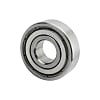
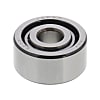















How can we improve?
How can we improve?
Thank you for your time.
Your feedback is essential for our continuous improvement
Privacy Policy
Thank you for your cooperation.
Thank you for your time.
Your feedback is essential for our continuous improvement
Please use the inquiry form.
Privacy Policy